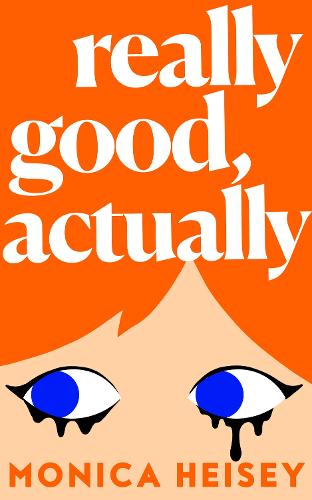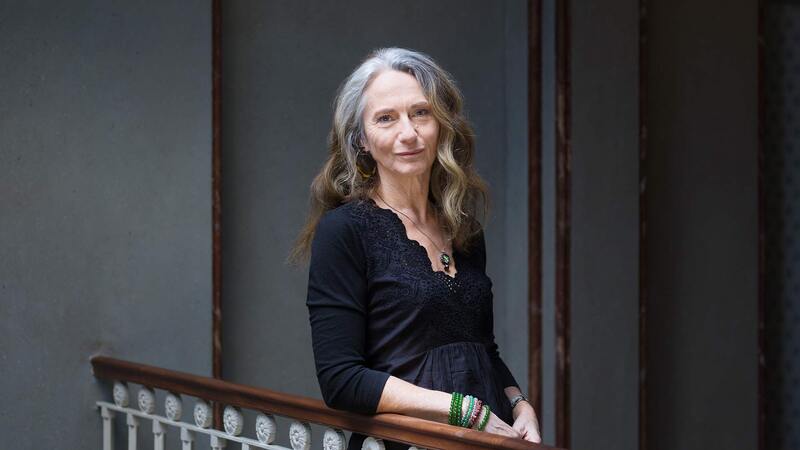You are viewing your 1 free article this month. Login to read more articles.
Monica Heisey discusses her debut Really Good Actually, heartbreak and self-discovery
 Madeleine Feeny
Madeleine FeenyNew Titles Fiction Previewer
I compile the monthly New Titles: Fiction. A freelance critic and editor, I previously held ...more
Really, Good Actually is a book that makes you guffaw on buses and send passages to your friends; that gives you the illusion of profound kinship with its author and compels you to share personal anecdotes with her.

New Titles Fiction Previewer
I compile the monthly New Titles: Fiction. A freelance critic and editor, I previously held ...more
Really, Good Actually is a book that makes you guffaw on buses and send passages to your friends; that gives you the illusion of profound kinship with its author and compels you to share personal anecdotes with her. “I have heard a lot of crazy divorce stories already, I love them,” smiles Monica Heisey, the London-based Canadian screenwriter reinventing the break-up novel. Pounced on by 4th Estate in a 48-hour pre-empt, this super-lead début has already been sold in 11 international territories and counts Rob Delaney and Dolly Alderton among its champions.
It charts a year in the aftermath of a Toronto couple’s decision to divorce, between narrator Maggie’s 29th and 30th birthdays, taking you inside her fevered brain as her sense of self dissolves. Yet far from being gloomy, it locates the absurdity in heartbreak, “both a huge, life-altering experience and this incredibly mundane thing that happens to most people multiple times.”
Written during the pandemic, with “no process whatsoever”, the novel was born out of Heisey’s desire to see her own predicament accurately reflected. Not recognising herself in Hollywood’s glossy middle-aged divorcees, she struggled to find representations of heartbreak that acknowledged that “it feels like the end of the world, but it’s actually not”. Although Heisey drew on her own feelings to write the book, she gave the real events a wide berth out of respect to her ex-partner, with whom she is not in contact. Accepting that readers would inevitably conflate her with Maggie, she didn’t worry too much about differentiation, but ramped up the emotion and toned down the self-awareness for comic or tragic effect, creating a “worst-case scenario” version of herself.
Nobody knew me as someone’s ex-wife or this person going through this awful thing, and British people aren’t going to talk to you about your feelings even if they do know
Having spent five years writing for TV shows including “Schitt’s Creek”, Heisey is not your typical wide-eyed début novelist. She first moved to London in 2010 for an early modern literature MA at King’s College, and stuck around for four years, supplementing a fledgling writing and comedy career by bartending for Secret Cinema, until dwindling visa options forced a return to Toronto. There, a spoof advice column became a book, I Can’t Believe It’s Not Better, published in 2016 by a Canadian indie press. It led to her first screenwriting job.
She also got married, “instantly” got divorced aged 28, and started coming back to the UK in 2017, finding relief in the distance. “Nobody knew me as someone’s ex-wife or this person going through this awful thing, and British people aren’t going to talk to you about your feelings even if they do know.”
Beyond performance
In the narrative arc she devised, the momentum comes not so much from whether Maggie will reunite with ex-husband Jon, but from her journey to self-knowledge. She is sometimes an exasperating protagonist, trapped by emotional repression and deflective humour. Events are filtered through her perspective, but gradually, skilfully, Heisey reveals Maggie’s self-delusion. The novel is all about the face we put on in difficult times, she says, and highlights the ways we extend that “everything’s fine!” performance even to ourselves.
Thinking about your body takes up a lot more space than many of us are willing to say outside of a very close group of friends
It captures the destabilising force of break-ups; in Maggie’s words, “with that piece removed, the entire puzzle looked wrong: did I have to re-choose everything?” In hilarious, brutal detail—including lists of Google searches, unanswered emails and fantasy scenarios interwoven throughout—it anatomises the stages of her grief, from insomniac burger binges and self-help books to a sensation of “dull invincibility” she christens “haha, so what?”.
Maggie explores her bisexuality, aided by “the apps”, but after a knock her self-esteem plummets and she alienates her friends. “There is a self-absorption that comes from being very devastated, which can feel very exciting but also, looking back, is a bit grim.” In contrast to other novels about “young, white women going mad” who often seem isolated, Heisey wanted to delve into the reality of a “messy character” for the people around her, and the real love story is one of friendship.
As Maggie withdraws socially, she seeks new connections and validation in a “sorority of unhinged internet friends”. The novel observes the ways online culture enables self-destructive behaviour and confronts body image and beauty standards with singular frankness. “Thinking about your body takes up a lot more space than many of us are willing to say outside of a very close group of friends,” says Heisey, who believes the body positivity movement, while exciting in many ways, has layered another pressure—to love yourself—on top of the existing one.
These days, she must have little time for Maggie-style spirals. She is in the early stages of a second novel, filming a romantic comedy series for Sky (slated for 2023 release) and developing a TV adaptation of Really Good, Actually. What is the number-one thing she would like readers to take away from the book? She grins. “It’s going to be bad, and then it’s going to be fine.”










